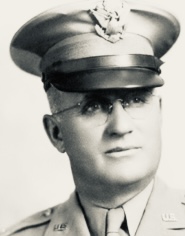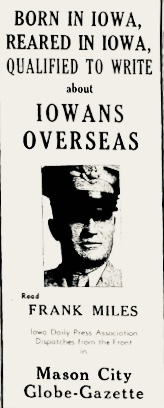
U.S. Army Maj. Frank Miles of Des Moines served during World War II as a war correspondent.
May/June 2025 (Volume 17, Issue 3)
By Michael Swanger
This year marks the 80th anniversary of the end of World War II and stories of Americans’ service, sacrifice and valor abound. Though many are about the Greatest Generation knee-deep in blood and guts fighting the foot soldiers of Hirohito and Hitler, others are equally poignant reminders of the sense of duty that Americans embodied during the war.
One such story is that of U.S. Army Maj. Frank Miles of Des Moines who served during World War II as a war correspondent for the National American Legion publication, Iowa Daily Press Association and WHO Radio from 1944 to 1945. His daily reports from the European, African and Pacific theaters about Iowans serving in the military during World War II were published or broadcast across Iowa and made him an Iowa “institution.”
A Fort Madison native who was born on April 2, 1890, Miles was a Drake University Law School graduate who was admitted to the Iowa bar in 1916 before joining the U.S. Navy to serve during World War I. After World War I, he worked as a reporter for Des Moines newspapers, served for two years as Des Moines city treasurer, became a founder and longtime editor of the Iowa Legionnaire, and held public relations jobs.
At age 54, Miles left his post as public relations director of state selective headquarters and editor of the Iowa Legionnaire to become a war correspondent. According to one newspaper report, his sense of duty to participate in a second world war and the allure of reporting from battlefields was too tempting for Miles to resist.
“A man of quick step and animated speech, Miles bore a happy, newspaperman’s smile before leaving Des Moines as he contemplated the prospect of a writing assignment of almost ‘dream’ proportions and of seeing of the war at first hand,” reported the Muscatine Journal and News-Tribune on Aug. 8, 1944.
While overseas, Miles churned out daily stories about Iowans serving during World War II. They included everything from one-sentence mentions of Iowans—including their hometown and location—to human interest stories, to graphic reports of the carnage of war … “as only an Iowan can write.”

No other story, perhaps, might have been as challenging for Miles to report as the one about the death of his youngest son, William Miles, an American bomber pilot killed by anti-aircraft fire over Italy on May 17, 1944.
William Miles was an 18-year-old Drake University freshman when he enlisted in the U.S. Army Air Corps in January 1942. His older brother, Frank Miles Jr., 20, had become an army aviation cadet the day war was declared. In a story published by the Mason City Globe Gazette on Aug. 29, 1944, the family’s patriarch wrote about the family’s loss.
“About the middle of May, when I learned I was coming across as a war correspondent for American Legion publications, I wrote him [William] I might see him shortly and jokingly added he might bring me home as a passenger. He never read the letter. It was returned June 10, marked ‘deceased,’” Miles reported. “On June 1 came a message that he had been killed in action May 17 … and that my son had been given a Christian, military burial in a U.S. Cemetery in Italy the following day.”
In August 1944, Miles visited his son’s grave.
“About sunset that evening I walked bareheaded and alone in among the rows of graves and found one I had come to visit. I knelt down and talked through the Lord to him and his comrades sleeping there and elsewhere, then I arose and saluted him and all of them and departed with pride and contentment in my broken heart.”

As the war raged on, Miles carried out his reporting duties. He witnessed its worst sights, including German concentration camps. He also reported that Berchtesgaden, the setting of Hitler’s mountain chalet, was “the most beautiful spot he ever visited.”
When World War II ended, Miles was in Arkansas meeting his infant grandson, William Baker Miles, Jr.
“I didn’t feel like celebrating,” Miles wrote. “I thanked God the war was over and that the killing and maiming of our boys had ended. I prayed that out of this would come a lasting peace.”
Miles also credited Iowans for their valiant service.
“I don’t see how the United States could have won the war without them,” he said. “It was amazing from the Azores to Casablanca, clear back to Honolulu—everywhere I met seven or eight soldiers, there always was one from Iowa.”
TO READ MORE FASCINATING STORIES ABOUT IOWA HISTORY, subscribe to Iowa History Journal. You can also purchase back issues at the store.
